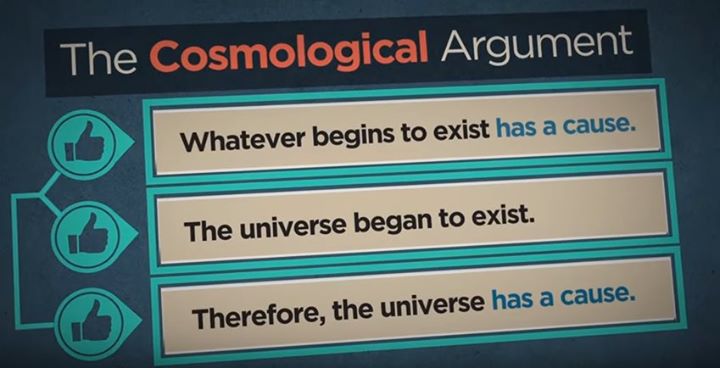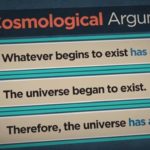
THIS POST IS ABOUT A CHRISTIAN THEISTIC CRITIQUE OF THE KALAAM COSMOLOGICAL ARGUMENT
Some atheists believe the following, namely that the argument below contains 1.) the composition fallacy or 2.) the fallacy of special pleading, and subsequently the argument is invalid, particularly be any argument which contains any informal fallacy is invalid. However i do not believe that this is really the case, particularly because it is contrary to reality. Hence their belief does not correspond to reality. However the truth does not grounds of the correspondence theory of truth. And subsequently that belief not true. It is either that a belief is true or false on grounds of the law of excluded middle. Therefore their belief is false.
It is important to note the following though, namely that this does not imply that the Kalaam cosmological argument is necessarily valid.
In fact, or to be brutally honest, it isn’t. Which is why the argument needs to modified.
But why is the Kalaam cosmological argument not informally valid? Bear in mind that the argument is formally valid because its structure is valid.
Now, here’s why:
The argument below or the Kalaam cosmological argument is informally invalid because 1.) it contains the equivocation fallacy and because 2.) it violates the law of identity and the law of non contradiction.
I’ll demonstrate this now.
But first let me put the argument in the image below in this post.
The argument is as follows:
1.) Whatever begins to exist as a cause.
2.) The universe began to exist.
Therefore 3.) the universe has a cause.
Now, consider my critique.
1.) The argument above argument or the Kalaam cosmological argument contains the use of the concept of universe inconsistently because the concept of universe in premise 2 is distinct from the concept of universe in premise or because the concept of universe in premise 2 is not about all of space, time, energy, matter, or the totality of everything that exists or about the universe as we know it, but about the very early universe, and because premise 3 is about the universe as we know it. [Bearing in mind that the thing that came into being, and then developed into the totality that we perceive as the universe as we know it now was not complete or it did not resemble the universe as we know it.]
2.) If an argument contains premises that are about the inconsistent use of one concept, or if an argument contains premises that can be perceived as the attribution of one concept to two ontologically distinct things, then the argument contains the equivocation fallacy, particularly because, this is, by definition, what the equivocation fallacy is.
And subsequently 3.) the Kalaam cosmological argument contains the equivocation fallacy.
4.) Every argument that contains the equivocation fallacy is not only informally invalid but also subject to the violation of the law of identity, particularly because the equivocation fallacy leads to the violation of the law of identity.
Hence 5.) the Kalaam cosmological argument is not only informally invalid but also subject to the violation of the law of identity.
6.) If an argument violates the law of identity, then the argument also violates the law of non contradiction, because the violation of the law of identity is indicative of the following proposition, that is to say, That A is not A.
So 7.) the Kalaam cosmological argument violates the law of non contradiction.
8.) For every argument, the argument is not only logically impossible, or logically nonsensical, but also logically incoherent if [and only if] it violates the law of non contradiction.
Hence 9.) the Kalaam cosmological argument is not only necessarily logically impossible, or logically nonsensical, but also logically incoherent.
10.) If the Kalaam cosmological argument is logically incoherent, the the Kalaam cosmological is not sound, particularly because only a logically coherent argument can be perceived as sound.
Therefore 11.) the Kalaam cosmological argument is not only A.) informally invalid, or B.) unsound, or C.) logically nonsensical, or D.) logically impossible, but also D.) logically incoherent.
This is why the argument needs to be modified.
It is important to note the following, namely that my critique was not presented against God or cause. No! For i believe the following, namely that this universe has a cause or a creator, but i do not believe that the Kalaam cosmological argument proves this soundly or validly, particularly because it contains a logical fallacy and because it violates the laws or principles of logic.
It is important to note the following as well, namely that “The big bang theory” is subject to this critique as well, particularly because the cosmological explanation contains the same fallacy and violation of the laws or principles of logic.
I need to state this one more time before i end this critique, namely that i believe that something began to exist in the past, and therefore that thing requires an external cause, particularly in order to explain the why it began to exist, and because every thing that begins to exists has a cause; however i do not believe that that thing was the universe as we know it or the totality of everything, because there would have been a distinction between that thing that developed into the universe as we know it today and the totality or the universe as we know it today.
I also believe the following, namely that it is logically impossible to articulate the following, namely that something that is complete began to exist, particularly because if we claim, for example, that a complete human began to exist, we’ve attributed the concept of human to two distinct things, because there is a clear distinction between the the early stages of the gestation period or that which developed into the human and the human, and therefore if we claim that, then our claim contains the equivocation fallacy.
Every claim that violates the equivocation fallacy violates the law of identity. And subsequently if claim that, then our claim contains the violation of the law of identity.Notice that the argument above does not entail the denial of the following proposition, namely that something came into being in the maternal uterus. No! On the contrary it is only denying the following, namely that that living thing, even the thing that gradually developed into a human being, is the same as the human being.
Which is why if one argued as follows, namely that 1.) Every thing that begins to exist has a cause, 2.) The human being [i.e President Trump] Began to exist, Therefore 3.) President Trump has a cause, his or her argument would be informally invalid, particularly because it contains the equivocation fallacy and the violation of the laws or principles of logic.
Nevertheless Trump is a contingent being. Furthermore i am not denying this.
But what does it mean to state the following via oral language or written language?-that is to say, that President Trump is a contingent being? Furthermore; how can we articulate what we mean without committing the equivocation fallacy or without violating the the laws and principles of logic?This question can be applied to the contingent universe as well if we modify it. Furthermore it is an important question, particularly because the Kalaam cosmological argument cannot be saved or modified without the question. But even if we cannot answer the question, this will not imply that there is no proof for the existence of God, particularly because there are other cosmological arguments, such as “The contingency argument”, that do not violate the laws of logic. Nevertheless we should try to save this traditional philosophical argument.



Comments